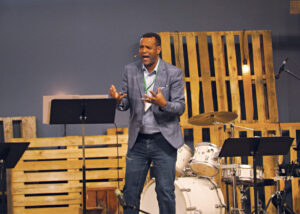In his seminar “Confessions of faith: Sources of unity or division,” Karl Koop told the story of 3,000 Mennonites who met during a five-hour meeting in Amsterdam in 1639 to bring together three Mennonite groups that had been severely divided.
The most contentious issue that divided them was how congregations should practise discipline. Koop, who teaches history and theology at Canadian Mennonite University in Winnipeg, said that in the early years of the 17th century, many disagreements among these Mennonite groups were resolved, and their confessions of faith became a unifying tool.
Within a few decades, however, there was new controversy over confessions of faith, and ministers were being asked to sign a form showing their agreement to a particular confession. Some ministers refused, saying that a confession of faith should not be a tool to determine who belonged and who did not. They said that Scripture and the Spirit of God were more important than confessions of faith. It took another 150 years before these Mennonites groups were able to be united.
Confessions of faith are important, said Koop. They help to teach what Christians believe and to talk to other denominations about their theology. The temptation is to regard them as key or to say they are irrelevant, depending on whether or not one agrees with them.
The introduction to the 1995 Confession of Faith in a Mennonite Perspective says that confessions serve the church because they “provide guidelines for the interpretation of Scripture,” but that the confession is “itself subject to the authority of the Bible.” Second, confessions “provide guidance for belief and practice,” but “a written statement should support, but not replace, the lived witness of faith.”
Koop pointed out that these introductory statements are important in understanding how to use this confession of faith. Faith evolves over time, said Koop. Mennonite thinking is shaped by Mennonite experiences, and a confession of faith is based on the best discernment in a particular time and place. However, eventually Christians end up thinking about their beliefs in new ways. Just because there are differences of opinion, Koop said that it should not be assumed that one side or the other is unfaithful. Nor should it be assumed that Mennonites of the past were strongly unified.
When asked about how it can be determined when a confession of faith still represents who Mennonites currently are and when it becomes a historical document, Koop responded that this challenge is what makes assemblies so important. Christians need to gather periodically to gather wisdom from across the country to determine what the Spirit of God is saying to the church, he concluded.
More about seminars at Assembly 2016:
Making a case for community
‘Young adults don’t need the church’
The future lies in the past
A vision for the MHC Archives and Gallery
Laments and hopes for MC Canada
Exploring tough subjects and intense spaces
Good news sometimes comes in small packages
‘Partnering with God’s healing and hope’
Seeing dystopian heroines as prophets






Leave a Reply
You must be logged in to post a comment.